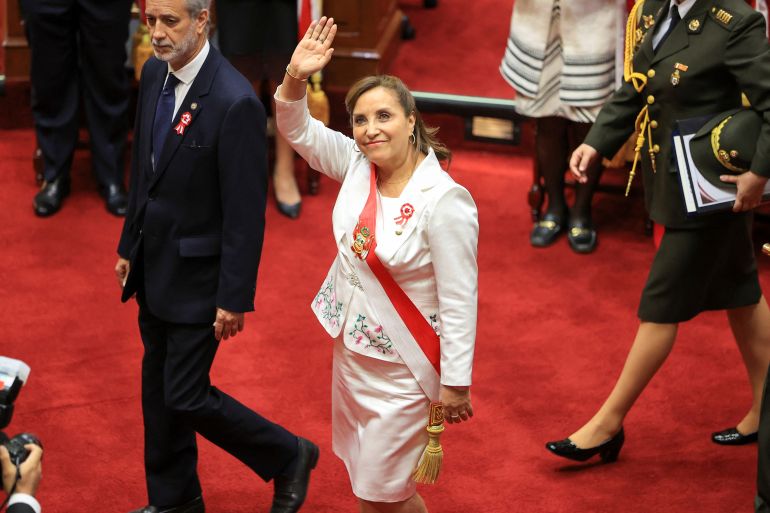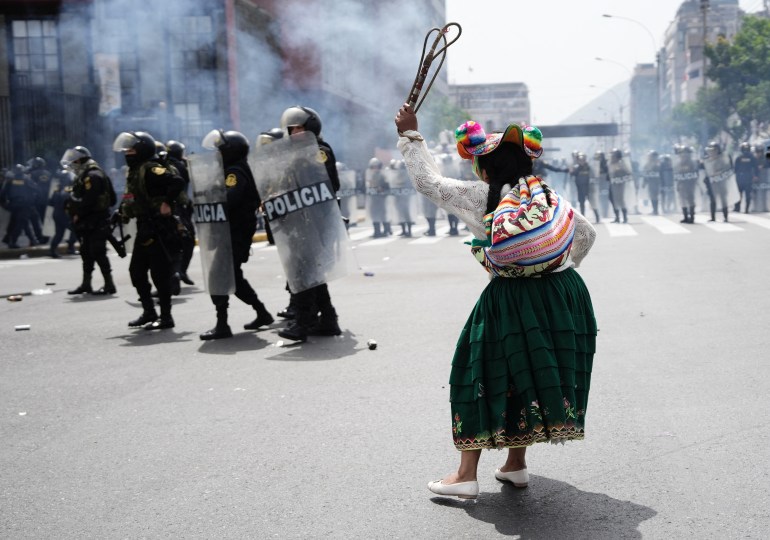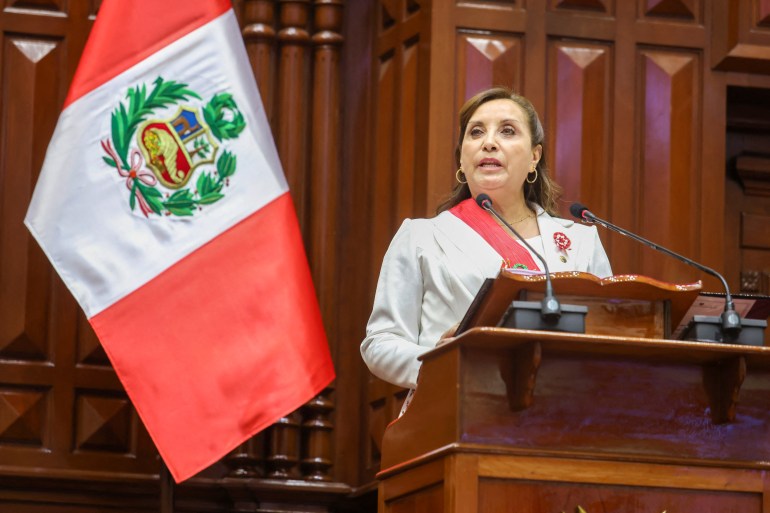Peru President Dina Boluarte calls for expansion of powers in speech
Her remarks, which came as part of a lengthy Independence Day address, came as protests continued in the capital Lima.

Peruvian President Dina Boluarte has called for a “great national reconciliation” in the wake of a fresh outburst of protests in the South American country.
Nevertheless, in Friday’s speech before Congress, Boluarte also appealed for legislative powers to be extended to the executive branch for 120 days, in an effort to curtail crime among other issues.
Keep reading
list of 3 itemsRights group denounces ‘brutal’ protest crackdown in Peru
Rights commission says Peru crackdown may qualify as a ‘massacre’
She argued the measures were necessary, as “Peru needs to face — with more strength and efficiency — delinquency and crime”.
“We assumed the government in the midst of one of the worst political, social and climatological crises that our country has experienced,” she told Congress as demonstrators faced tear gas outside on the streets of the capital Lima.
Boluarte addressed the nation in a lengthy, three-hour speech as she marked her first Independence Day holiday as president.

Since taking office in December, her administration has faced intense protest, with calls for her resignation, the dissolution of Congress and early elections to be scheduled.
In response, security forces have attempted to tamp down the demonstrations, in some cases using live ammunition. Over 60 people have died in the clashes, with human rights organisations warning that some deaths could be considered “extrajudicial executions”.
Much of the criticism has been directed at Boluarte herself, and on Friday she struck a conciliatory note, speaking directly to the families of protesters and police killed.
“With deep and painful consternation, I ask for forgiveness on behalf of the state,” Boluarte said in her speech.
Boluarte has previously alleged criminals and “terrorists” had stoked violence in the protests and that the demonstrations were a “threat to democracy”.

An ‘unholy alliance’
Journalist and historian Javier Farje told Al Jazeera that Congress will likely grant Boluarte the additional powers she requested, though they may augur further political repression.
“There’s been an unholy alliance between the right and left within Congress to support Boluarte, to support each other, and to prevent elections from happening before 2026, which is when the [current term] period ends,” he explained.
Both Boluarte and the opposition-led Congress have faced dismal approval ratings since the protests first broke out, following the December 7 removal of former President Pedro Castillo.
A left-leaning union organiser from the countryside, Castillo was facing his third impeachment hearing when he attempted to dissolve Congress, a move some denounced as a coup.
By the day’s end, Castillo was removed from office and placed in custody on charges of “rebellion”.
“Before, some of the protests were in defence of former president Pedro Castillo,” Farje explained. “That’s no longer the case. People who have been protesting have been demanding early elections, but Congress has decided not to do that, and that’s going to increase tensions in Peru at the moment.”
New infrastructure for rural Peru
A poll this month from the Institute of Peruvian Studies showed 75 percent of Peruvians want Boluarte to resign, with 80 percent approval for early elections.
During her lengthy speech, Boluarte unveiled a series of policy proposals designed to shore up her approval ratings, including investments in infrastructure and six new hospitals, many in southern, more rural areas like Arequipa and Puno.
“She’s trying to appease people, trying to calm people down and prevent more demonstrations from happening, especially these marches from the countryside to Lima,” Farje said.
But he questioned whether Boluarte would be able to follow through with the construction plans — and whether any goodwill generated from the proposals will last over the long term.
“There is no money in the treasury in Peru at the moment. Inflation is pretty high. There is no foreign investment because of the political instability in Peru. So, it’s going to be very difficult for her to find the money to build these hospitals. And that will make the situation even worse. Will that be enough to calm people down?”

A return to a bicameral Congress?
One proposal that drew divided reactions concerned the future of Congress itself.
Boluarte recommended Peru consider adding a second chamber to the legislative body, as it had in the past.
Peru switched to a unicameral — or one-chamber — Congress in the 1990s when then-President Alberto Fujimori dissolved the existing opposition-led legislature in a controversial self-coup.
The move allowed Fujimori to establish a new constitution and gain a majority of support in the newly established unicameral body.
The current Congress consists of 130 members, each serving a five-year term. The number of representatives assigned to a given region is determined by the population in the area.
Under Boluarte’s proposal, Peru would “relaunch” its Senate, elected from a “single national district”.
“The idea is to have a Chamber of Deputies with majorities and a proportional Senate,” Boluarte said in her speech.
Farje was sceptical that the switch to a bicameral legislature would generate political support.
“That didn’t go down particularly well among some people,” he told Al Jazeera.
Afterwards, one congressman, Carlos Anderson, took to social media to denounce the speech as an “infinite list of announcements” and a “rain of promises” that would be completed “God knows when”.